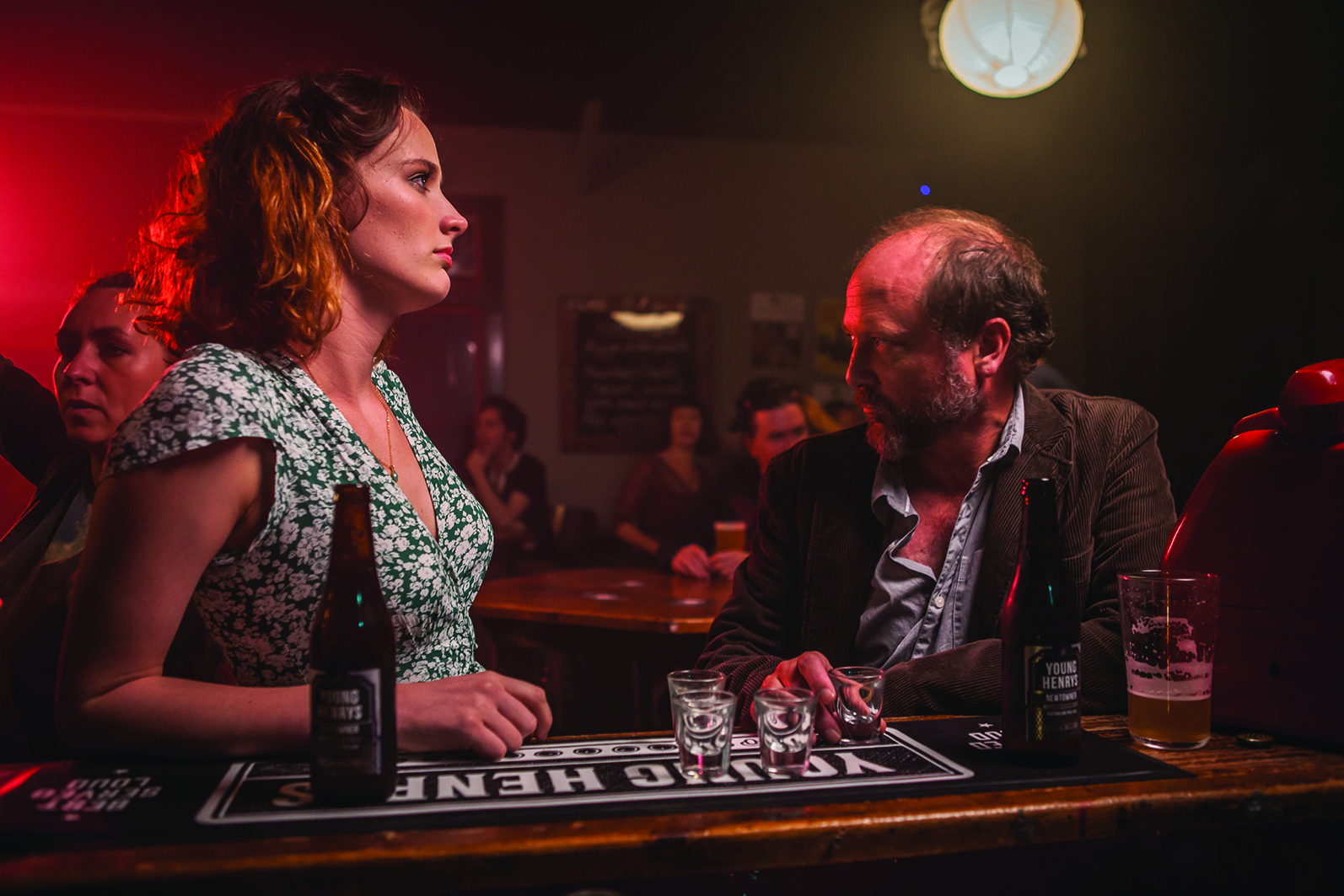Every year since 1945, Australian schools and libraries have celebrated Book Week: a festival intended to instil a love of literature in young people.[1]For more information on Book Week, see its official page on the Children’s Book Council of Australia website, <https://www.cbca.org.au/cbca-book-week>; and ‘Children’s Book Week Posters’, State Library of South Australia website, <https://digital.collections.slsa.sa.gov.au/nodes/view/2663>, both accessed 26 February 2019. The climax of the week is a costumed parade in which children, teachers and librarians dress up as their favourite literary characters. In writer/director Heath Davis’ dark-comedy film Book Week (2018), a disagreeable high school English teacher spends a week masquerading as his favourite literary character – his fantasy of himself as a successful novelist.
Nicholas Cutler (Alan Dukes) was once a bad boy of Australian literature. His breakthrough novel was published to critical acclaim eight years ago, but his drunken antics on the press tour killed his career. Now, he’s stuck teaching English at Little Fields High School, somewhere in the Blue Mountains. Nick despises his phone-prodding students because they don’t care about literature. His colleagues despise him – especially the long-suffering principal (Tiriel Mora). And head teacher Lee (Susan Prior) is seemingly only his lover because she’s out of better options.
But Nick has a chance to turn over a new leaf. He’s deigned to pen a trashy zombie novel, and his agent, Blake (Rhys Muldoon), has managed to sell it to a pair of braying publishing bros, Rob (Toby Schmitz) and Adam (Khan Chittenden) – on the condition that Nick rewrite it as a vampire novel. If Nick can behave himself for just the week until the contract is signed, a comeback could be his. But, as the Little Fields school community gears up for Book Week, Nick retreats into self-sabotage, evading responsibilities of all sorts.
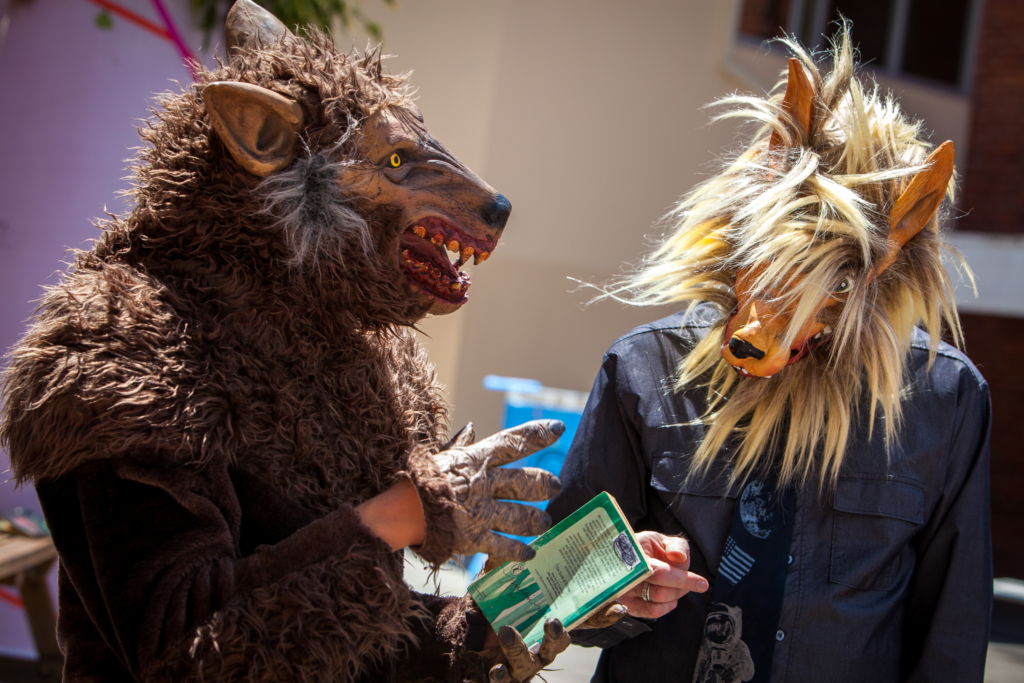
Davis has produced something similarly evasive. Book Week is ambivalent about its antiheroic protagonist: it doesn’t really invite sympathy for Nick, but neither does it truly delight in nor condemn his awfulness. Instead, the film unfurls shaggily, like an experiment in the limits of audience empathy, tantalising us with the possibility of Nick’s comeuppance but being clear that he does not deserve redemption.
Accordingly, upon Book Week’s release late last year, some critics struggled to reconcile Nick’s unrelenting unpleasantness with the film’s comedic tone. For instance, The Sydney Morning Herald’s Sandra Hall argued that while the ‘cranky, boorish’ teacher’s antics ‘precipitate one or two pratfalls, his indestructible smugness mean[s] that they produce few laughs’.[2]Sandra Hall, ‘Book Week Review: With a Boorish Teacher as Its Hero, Comedy Struggles for Laughs’, The Sydney Morning Herald, 23 October 2018, <https://www.smh.com.au/entertainment/movies/book-week-review-with-a-boorish-teacher-as-its-hero-comedy-struggles-for-laughs-20181022-h16yiz.html>, accessed 20 February 2019. In a much more scathing review, Isolated Nation’s Joshua Peach wrote that the film ‘should be lambasted for believing that un-likeability is a substitute for original or interesting. Cutler is an anti-hero in the dullest and most neutered form’.[3]Joshua Peach, ‘Film Review: Is Book Week Better Left on the Shelf?’, Isolated Nation, 21 November 2018, <https://isolatednation.com/articles/2018/11/21/book-week-better-left-on-the-shelf>, accessed 20 February 2019.
Can we only tolerate an unlikeable hero when he’s young, cool and gorgeous, or perhaps when he pits himself against social rules and niceties that we secretly oppose? Or do we tolerate unlikeability only as a character’s starting point on a journey of self-improvement? Book Club intertwines these questions with distinctly Australian parodies of two well-worn film motifs: the ‘creative man in crisis’ and the ‘inspirational teacher’.
Localising the creative man in crisis
While antiheroes have been celebrated on the Australian big screen ever since the nation’s first feature, The Story of the Kelly Gang (Charles Tait, 1906), these are not often creative professionals. Australian cinema prefers alienated rovers like Max Rockatansky (Mel Gibson in 1979–1985, Tom Hardy in 2015) in George Miller’s Mad Max cycle or Jay Swan (Aaron Pedersen) in Ivan Sen’s Mystery Road (2013) and Goldstone (2016), or the garrulous murderers of Chopper (Andrew Dominik, 2000), Wolf Creek (Greg McLean, 2005), Animal Kingdom (David Michôd, 2010) and Snowtown (Justin Kurzel, 2011).
One of the rare Australian films to follow a creative antihero is What I Have Written (John Hughes, 1996), in which a wife discovers a novella manuscript by her comatose husband that tells a shocking parallel story about their marriage. Another is Bliss (Ray Lawrence, 1985), adapted from Peter Carey’s eponymous novel, which follows an adman’s existential crisis. And Ruben Guthrie (2015), also set in the world of advertising, is based on writer/director Brendan Cowell’s play of the same name, which fictionalises his own drunken bad behaviour.
In contrast, Hollywood has a rich cinematic tradition of the creative man in crisis, from the titular blocked screenwriter in Barton Fink (The Coen brothers, 1991) to the neurotic, nostalgic writer-protagonists of Woody Allen films including Manhattan (1979), Deconstructing Harry (1997), You Will Meet a Tall Dark Stranger (2010) and Midnight in Paris (2011). In these stories, the male protagonist finds himself at a creative crossroads whereby his self-image based on literary snobbery duels with commercial demands and chaotic personal circumstances. Such films are also driven by the literary myth that writers should be outsiders who succeed because of pure talent and taste. Another beloved myth is that literary reputations require a certain amount of suffering. Hence, male-crisis narratives romanticise authors’ self-destructive failure as much as their literary triumphs against the odds.
The early 2000s saw a particular focus on white men’s midlife creative neuroses. Michael Douglas played a has-been author and now creative-writing lecturer in Wonder Boys (Curtis Hanson, 2000), based on the novel by Michael Chabon. Nicolas Cage had a metatextual turn as struggling screenwriter Charlie Kaufman in Adaptation. (Spike Jonze, 2002). Of the titles in this loose subgenre, Sideways (Alexander Payne, 2004) is the film Book Week most resembles. Having its origins in Rex Pickett’s eponymous novel, Sideways follows a depressed, alcoholic, middle-aged failed writer turned high school English teacher – who, despite his own failures, is intensely snobbish – over a pivotal week when a publisher is considering his manuscript. Indeed, Book Week’s Dukes has a strong physical resemblance and similar acting style to Sideways star Paul Giamatti.
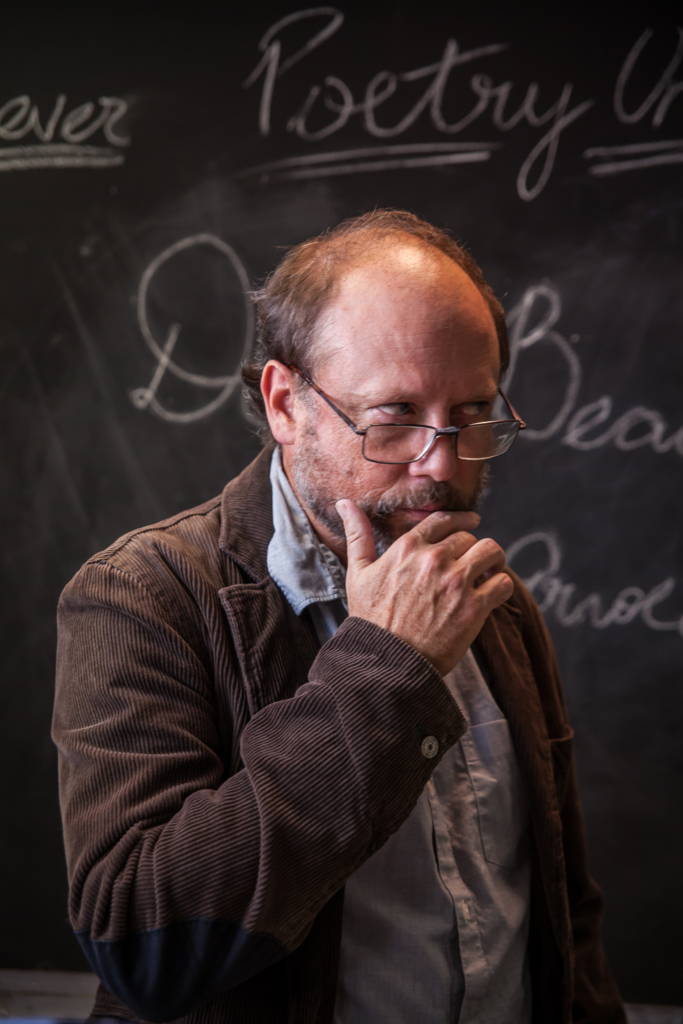
Davis originally wrote the role of Nick for Cowell,[4]Don Groves, ‘Al Dukes Lands the Lead in Heath Davis’ Comedy Book Week’, IF.com.au, 12 January 2018, <https://www.if.com.au/al-dukes-lands-lead-heath-davis-comedy-book-week/>, accessed 20 February 2019. whose casting would have better aligned with the premise that Nick had been feted as an enfant terrible within the past decade (Cowell’s alter ego Ruben Guthrie also seems to have influenced Nick’s drunken tendencies). When Cowell became unavailable, the casting of Dukes allowed Book Week to evolve into the story of an arrogant blowhard who had never really succeeded. As Davis recalls in interview: ‘I thought I needed a Paul Giamatti in Australia and I thought “that’s Alan”’.[5]Heath Davis, quoted in Garry Maddox, ‘Lessons in Life: How a Casual Teacher Finally Became a Filmmaker’, The Sydney Morning Herald, 19 October 2018, <https://www.smh.com.au/entertainment/movies/lessons-in-life-how-a-casual-teacher-finally-became-a-filmmaker-20181010-p508rd.html>, accessed 11 February 2019.
Book Week signals Nick’s imagined allegiance to the myths of creative crisis by beginning each ‘act’ with an on-screen quote from a famous author of the blokey, swaggering variety that Nick idolises and emulates. F Scott Fitzgerald, Ernest Hemingway and Charles Bukowski were all inveterate boozers with chaotic personal lives, yet, somehow, they’ve emerged into posterity with their reputations not just intact, but enhanced. Nick’s relationship to books both drives and restrains him: he clings to his snobbery because it allows him the self-respect his other actions have masochistically stripped away. Does he hope a baptism of whiskey will elevate him to the ranks of literary legends? Or is he self-medicating out of avoidance, because he’s afraid that, if he looks honestly at himself and his writing abilities, he won’t like what he sees?
These questions hang unanswered – but, importantly, the film does not buy into the myths that animate Nick. Instead, it deliberately maximises his unlikeability by taking every opportunity to puncture his image of himself, showing how vain and pathetic he really is. Indeed, the film is full of awfulness: the kind that’s stressful to watch because it’s not treated as, and hence not able to vicariously become, enjoyable.
Nick is introduced riding his bike to school, smoking a joint, but this vision of a fancy-free rebel quickly evaporates as we see the contempt and exasperation with which just about everyone in his life treats him. In the scorn-filled scenes between Nick and his dad, Ken (Nicholas Hope), we get a brief insight into where Nick’s attitude problem might have begun. But, at almost every opportunity, the film returns to its baseline of Nick’s selfishness, making no effort to excuse or romanticise his behaviour.
Perhaps this is where Book Week’s ‘Australianness’ lies. Many Hollywood films about creative crisis are resolved – and their antiheroes, rewarded – when these men change their self-destructive habits, or learn to treat others with more kindness and respect. Book Week grants Nick only an ambivalent redemption. At the end of the film, he has failed to embody the literary archetypes he previously prized. But he has managed to preserve his key relationships with his family and with Lee, and seems at peace with his life of suburban mediocrity.
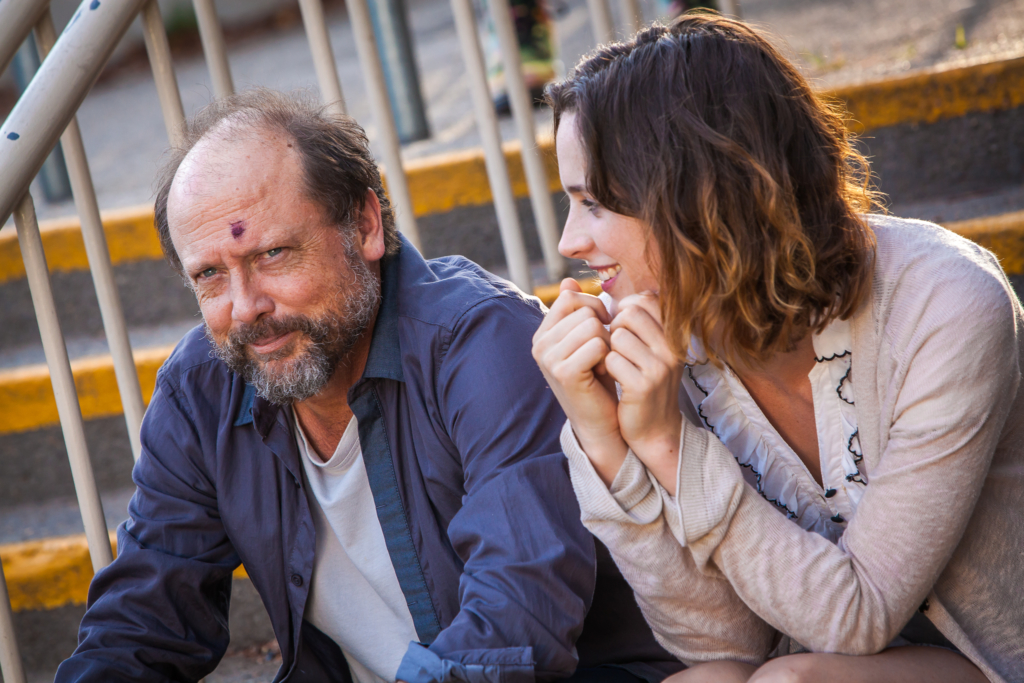
Deconstructing the inspirational teacher
Nick’s character is based on Davis’ own experiences of teaching after struggling to launch a Hollywood career, as well as his observations of disaffected fellow teachers. ‘Some of the smartest, most empathetic people I’ve met in my life – not all of them but a handful – are teachers,’ Davis told The Sydney Morning Herald last year.
[B]ut I was pretty depressed from mixing with these people, looking like my dream was going to come true, but teaching on a substitute basis at a public school. For my own sanity, I wrote this film about how bizarre the experience was. It was always going to be a black comedy because I had to keep a sense of humour.[6]ibid.
Despite Nick’s occupation, Book Week is not really about teaching or mentorship. We rarely see him in the classroom. Nor is the film particularly effective in exploiting the comic possibilities of Book Week itself, apart from showing Nick’s colleagues wearing literary-themed costumes. On the contrary, Davis goes to great pains to show that most of Nick’s students and colleagues despise him. This atmosphere of disaffection permeates the broader setting so that, depending on the viewer’s tastes, the film is either off-puttingly cynical or bracingly realistic in the profound disdain it shows for the school environment. Little Fields is not the kind of grim, unruly school depicted in films including Blackboard Jungle (Richard Brooks, 1955) and Dangerous Minds (John N Smith, 1995), but it is a place devoid of ‘inspiration’, where knowledge and personal development are seldom actually imparted.
Nick’s chief antagonist is Melanie (Rose Riley), a senior student and aspiring novelist whose function in the story is reminiscent of that of the ambitious, overachieving student politician Tracy Flick (Reese Witherspoon) in Election (Payne, 1999). Melanie both detests Nick and craves his approval regarding her manuscript; she’s more like him than either of them would admit. Sensing – probably correctly – that Melanie is more talented than him, Nick repeatedly rebuffs her; their expletive-filled encounters are a highlight of the film.
Some of Book Week’s other amusing moments come courtesy of Tyrell (Thuso Lekwape), a loveable, permanently stoned student whose illicit antics Davis treats with an affection denied to Nick himself. In particular, Tyrell plays a key role in embarrassing Nick, who has plotted to portray himself flatteringly as a mentor to at-risk youth during an interview with a local magazine. ‘Why does he always have to learn the hard way?’ Nick sighs about Tyrell.
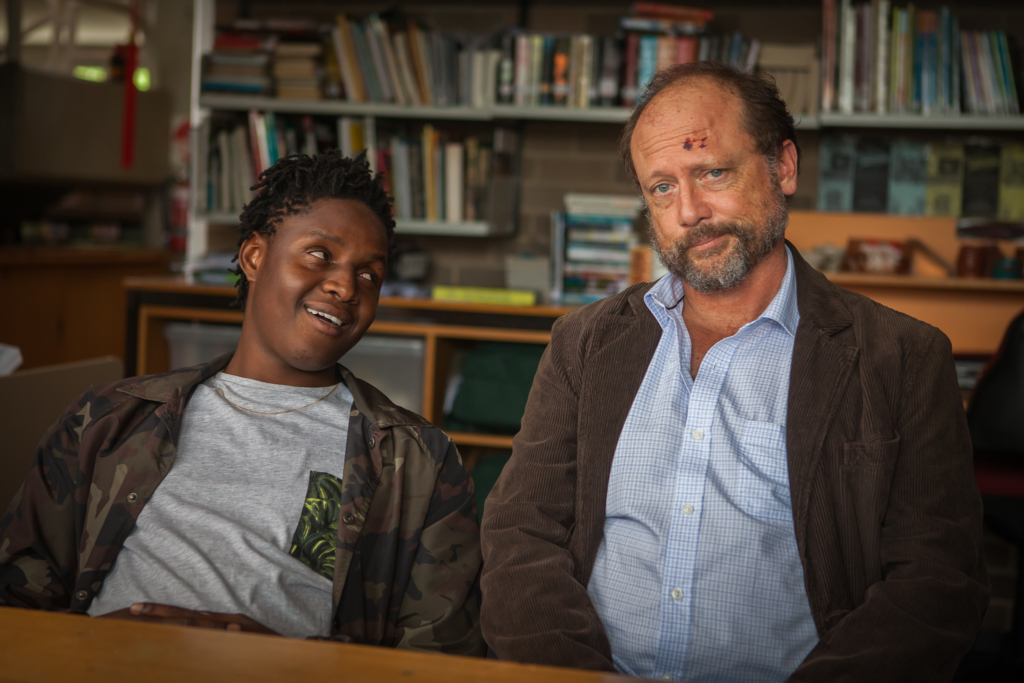
Tellingly, this patronising comment could just as easily apply to Nick himself, who is in the weird position of being able to see his own downfall but also unable to shrink from it. Part of what makes him unsympathetic is that, despite his nominal role of authority, he never seems in command of a situation. ‘Promise me you won’t make any more promises,’ Lee begs Nick after their tryst in the English department storeroom. She is destined to be prodigiously disappointed, much like Nick’s harassed sister, Nadine (Pippa Grandison), who repeatedly begs for her brother’s support. This is, in fact, one rather retrograde aspect of the film: it treats these female characters as guardians of responsibility, the poles towards which the unlikeable male antihero must align his moral compass, redeeming himself by earning their forgiveness.
Two other female characters, however, are much more engaging because they see Nick at his most vulnerable, when his bravado is at its thinnest. Samantha (Jolene Anderson), a former student of Nick’s, is now the deadpan cop who always seems to bust him in a moment of undignified criminality. ‘I actually should arrest you for being a crap teacher,’ she says. And Sarah (Airlie Dodds) drunkenly meets Nick in a bar when he’s celebrating his book deal, then takes him home for an ill-advised one-night stand. Not only does she call him out on his false claim that he had been doing volunteer work, but, awkwardly, she’s also revealed to be a student-teacher whose week-long placement Nick must now supervise. He swiftly recruits her as a protégée, expansively sharing his tips on how to evade the most tiresome aspects of teaching, and she becomes his sidekick in his self-destructive antics.
Sarah is the closest thing Nick has to an ally and confidant. She doesn’t despise him, as others around him do, and nor does she hold him to moral standards she already knows he won’t meet. Instead, her perspective aligns with that of the film. She observes Nick with the insight he lacks, but she isn’t there to make him appear more likeable or to ‘inspire’ him to be a better writer, teacher or person. Instead, as in other filmic moments of midlife male crisis so familiar as to render them clichés, Sarah is the no-nonsense figure who forces Nick to be honest with himself. She offers the key lesson of this film: that when the familiar stories we tell ourselves aren’t working, we can always tear out the page and start a new draft.
Endnotes
| 1 | For more information on Book Week, see its official page on the Children’s Book Council of Australia website, <https://www.cbca.org.au/cbca-book-week>; and ‘Children’s Book Week Posters’, State Library of South Australia website, <https://digital.collections.slsa.sa.gov.au/nodes/view/2663>, both accessed 26 February 2019. |
|---|---|
| 2 | Sandra Hall, ‘Book Week Review: With a Boorish Teacher as Its Hero, Comedy Struggles for Laughs’, The Sydney Morning Herald, 23 October 2018, <https://www.smh.com.au/entertainment/movies/book-week-review-with-a-boorish-teacher-as-its-hero-comedy-struggles-for-laughs-20181022-h16yiz.html>, accessed 20 February 2019. |
| 3 | Joshua Peach, ‘Film Review: Is Book Week Better Left on the Shelf?’, Isolated Nation, 21 November 2018, <https://isolatednation.com/articles/2018/11/21/book-week-better-left-on-the-shelf>, accessed 20 February 2019. |
| 4 | Don Groves, ‘Al Dukes Lands the Lead in Heath Davis’ Comedy Book Week’, IF.com.au, 12 January 2018, <https://www.if.com.au/al-dukes-lands-lead-heath-davis-comedy-book-week/>, accessed 20 February 2019. |
| 5 | Heath Davis, quoted in Garry Maddox, ‘Lessons in Life: How a Casual Teacher Finally Became a Filmmaker’, The Sydney Morning Herald, 19 October 2018, <https://www.smh.com.au/entertainment/movies/lessons-in-life-how-a-casual-teacher-finally-became-a-filmmaker-20181010-p508rd.html>, accessed 11 February 2019. |
| 6 | ibid. |
